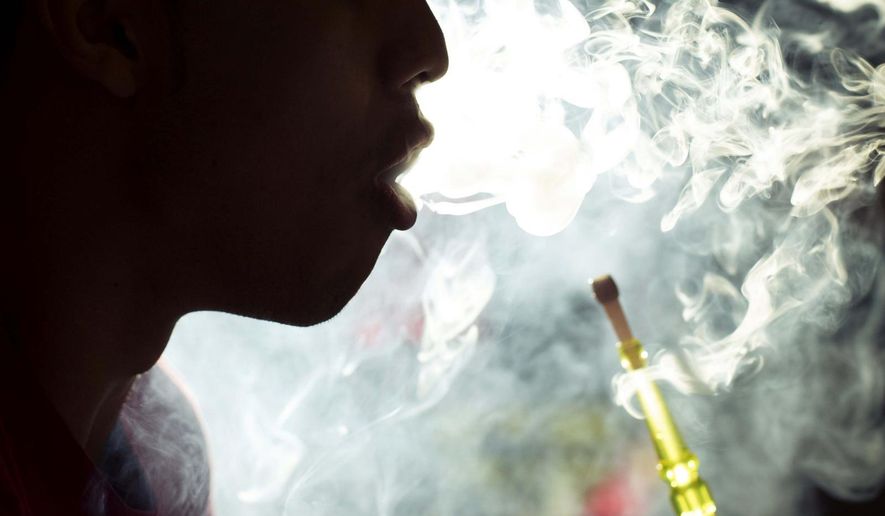The Virginia Supreme Court has ruled that a Blacksburg hookah lounge is not exempt from the state’s ban on smoking in restaurants, turning back a challenge that threatened to create a wide new exemption for bars and restaurants to allow tobacco use.
The court overturned a decision that created a loophole in the smoking ban when the Court of Appeals of Virginia found that She-Sha Hookah Cafe and Lounge was exempt from the Virginia Indoor Clean Air Act because, although it served food as a restaurant, it derived the majority of its business from being a retail tobacco store. Smoking remains legal in such establishments in Virginia.
But in the 20-page opinion issued Thursday, Justice William Mims wrote that the state’s clean air act does not define the term “retail tobacco store” and that for the court to interpret the term broadly “would invite any restaurant to avoid [the smoking ban] by selling tobacco at retail or rebranding itself as a retail tobacco store that happens to prepare and sell food.”
Michael Kelly, spokesman for Virginia’s Office of the Attorney General, which argued the case, said the ruling will prevent restaurants elsewhere in the state from skirting the ban on the grounds that they also sell tobacco products.
“The court found that restaurants could not exempt themselves from Virginia’s restaurant smoking ban by selling tobacco to their patrons,” Mr. Kelly said.
Hookah lounges such as She-Sha allow customers to rent a communal water pipe through which wet, flavored tobacco — known as shisha — is smoked. The businesses are allowed to operate despite the ban on smoking in restaurants because the law contains some exceptions.
SEE ALSO: Boston trumps D.C. in bid to host 2024 Olympics
“Hookah bars may, like other establishments, lawfully permit smoking under the specific exceptions included in the smoking ban, such as offering a smoking section with separate ventilation,” Mr. Kelly said.
The problem with She-Sha was that it did not make any of the required modifications, yet it continued to allow hookah smoking throughout its entire premises — despite being licensed as a restaurant — after Virginia’s smoking ban took effect in December 2009. The Virginia Department of Health slapped the lounge with smoking violations in 2010, setting the court case in motion when the lounge sought to fight the citations.
The law permits smoking in restaurants located on the premises of any manufacturer of tobacco products. But it explicitly states that the clean air act should not be construed to “regulate smoking in retail tobacco stores, tobacco warehouses, or tobacco manufacturing facilities.”
The Virginia Supreme Court decision noted that including restaurants that also categorize themselves as retail tobacco stores in that provision “would frustrate the purpose of VICAA and roll back its protections for restaurant customers and employees throughout Virginia, and not just in a single hookah bar in Blacksburg.”
While owners of She-Sha declined to comment, a lawyer representing the establishment expressed disappointment in the ruling.
“The decision advances a strict interpretation of the Virginia Indoor Clean Air Act that effectively writes out of the law any protection afforded for establishments like She-Sha whose business model is built around the retail sale and consumption of tobacco on premises but who also serve food,” attorney Andrew Connors said.
SEE ALSO: Martin O’Malley: ‘My feelings were hurt’ by Maryland voters
In surrounding jurisdictions that have also banned smoking, different rules apply to hookah lounges.
In the District, tobacco bars that generate 10 percent or more of annual income from on-site sale of tobacco products can qualify for an exemption of the ban as can retail stores that generate at least 75 percent of income from tobacco sales. In Maryland, the law banning smoking carves out an exemption for retail tobacco businesses at which the primary activity is the retail sale of tobacco products and accessories, but there are no specific laws regulating hookah lounges and there is little regulation of the establishments by the Department of Health.
Newsha Aboughaddareh, marketing director of the Arlington hookah lounge and restaurant Guarapo, said her hookah lounge already operates under the Virginia regulations that require separate smoking and nonsmoking areas and separate ventilation, so it will not be affected by the ruling.
“It makes sense. Some people come here for dinner,” Ms. Aboughaddareh said. “I think offering a nonsmoking area is helpful for people who don’t want to be in a room like that.”
It was unclear whether the owners of She-Sha might also act to provide separate ventilation systems so as to become compliant under the current laws. Mr. Connors said he’d like to see the Virginia General Assembly revisit the smoking ban to provide further interpretation.
“Different from restaurants whose patrons and employees expect to enjoy food and beverage service free of a smoking environment, She-Sha caters exclusively to patrons and employees who choose to dine and work in an environment in which hookah pipe smoking is an expected and desired activity,” Mr. Connors wrote in an email response to questions. “Ultimately, the task falls back to the General Assembly to amend the Act to more expressly recognize the difference between the two and ensure the rights of establishments like She-Sha and its patrons are advanced and the businesses can remain viable without the undue, and often unsustainable, costs and burdens imposed on them by the Act.”
• Andrea Noble can be reached at anoble@washingtontimes.com.




Please read our comment policy before commenting.